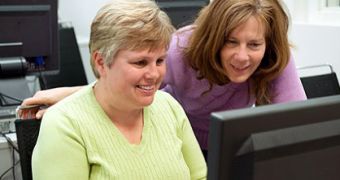Microsoft is right on track to reaching the goal of the Elevate America initiative announced on February 22nd, 2009, namely providing technology training and 21st-century skills education to at least 2 million people in the United States. In partnership with 32 states, the software giant already offered in excess of 800,000 computer skills training vouchers designed to help unemployed and underskilled workers find jobs.
This is undoubtedly a success story for the Redmond company, one that needs continued investment and increased interest from more U.S. states. After all, Microsoft’s partnership with state governments started with just Florida, New York, and Washington, but grew to a total of 32 states.
Training and certification vouchers are provided free of charge through the Microsoft Elevate America voucher program.
At over two years since the initiative was introduced, Microsoft looked back at the impact of the program and provided the results in a report titled: “Elevate America’s State Voucher Strategy to Promote Employability” available for download here.
Andrea L. Taylor, Director of Community Affairs in North America, Microsoft offered a few highlights from the company’s findings:
“• Program attracted individuals with post-secondary education: Nearly half of the voucher recipients had at least a two-year degree and 70 percent had some post-secondary education.
• Internet access affects success: Three factors coincided with higher activation rates of the vouchers: higher per capita Workforce Investment Act funding, a greater proportion of urban residents and a greater proportion of households with Internet access.
• Tailored assessments lead to implementation: Career-center based distribution of the vouchers served a greater proportion of unemployed workers – 70 percent compared to 57 percent who received vouchers electronically. However, career centers typically serve those with below-average technology abilities.”
Conclusions from the evolution of Elevate America so far also reveal that some 39% of people that jumped at the chance of getting free technology training were in the 36-50 year-old age range, with women making up the majority of participants, no less than 54%.
“Looking toward the next decade—when more than three-quarters of all jobs are expected to require some technology skills—Microsoft is strengthening its commitment to providing online learning tools that empower people to reach their full potential and help them achieve career success,” revealed Pamela Passman, Corporate Vice President, Global Corporate Affairs.

 14 DAY TRIAL //
14 DAY TRIAL //